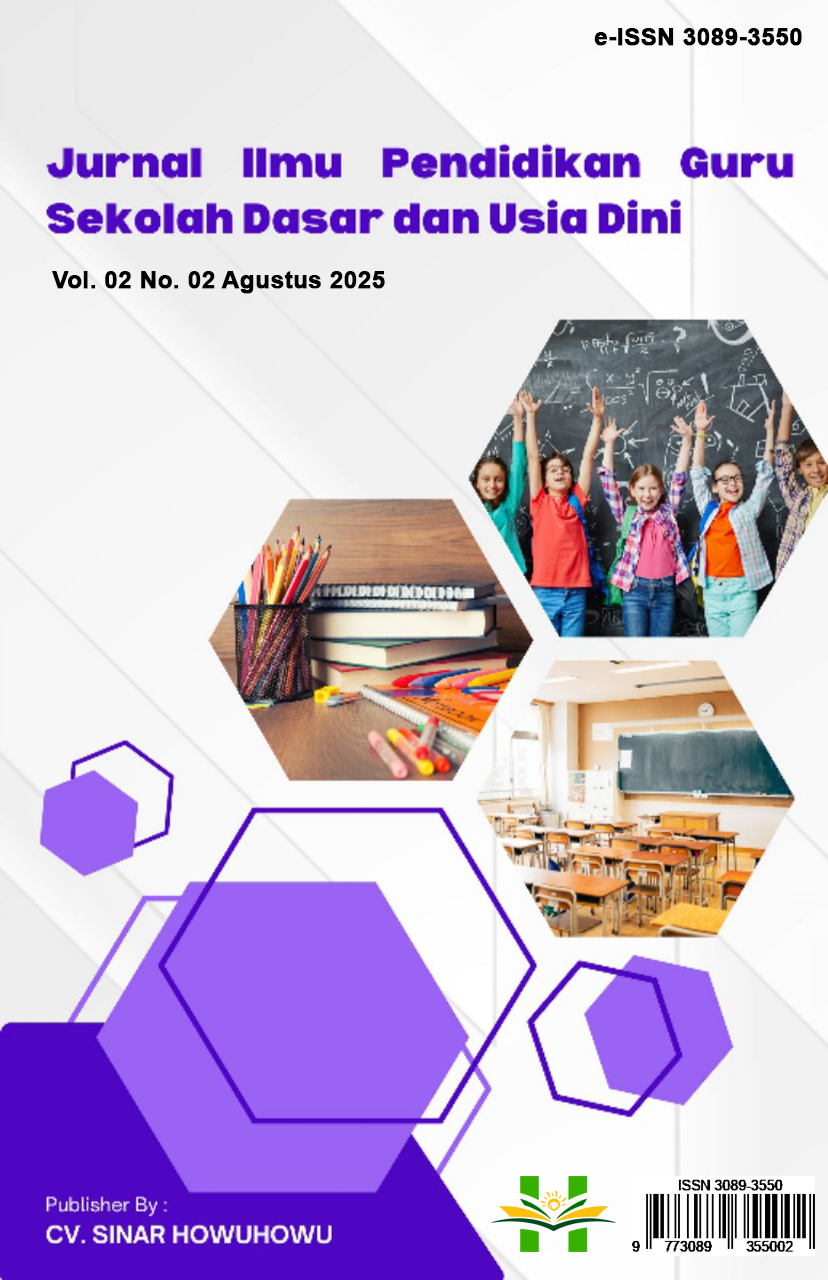Implementasi Pembelajaran Mendalam (Depp Learning) Di Sekolah Dasar Sebagai Penguatan Kurikulum Merdeka
DOI:
https://doi.org/10.70134/pedasud.v2i2.711Keywords:
Deep learning, Elementary Schools, Independent Curriculum, LearningAbstract
This study aims to theoretically examine the implementation of deep learning in elementary schools as a strategy to strengthen the implementation of the Independent Curriculum. The method used in this study is library research, analyzing various scientific sources such as books, educational journals, policy articles, and official documents from the Ministry of Education, Culture, Research, and Technology. Deep learning is understood as an approach that emphasizes in-depth conceptual understanding, critical and reflective thinking skills, and the ability to connect concepts to real-life contexts. The results of the study indicate that the principles of deep learning are highly relevant to the Independent Curriculum approach, particularly in differentiated learning, project-based learning, and formative assessment. This approach not only encourages students to actively construct knowledge but also supports the formation of a Pancasila learner profile. Furthermore, deep learning also has theoretical implications for developing the role of teachers as facilitators, contextualizing learning design, and creating a more meaningful and holistic assessment system. Therefore, it is not surprising that the government will implement deep learning in elementary schools starting in the 2025/2026 academic year. This study recommends conducting further field-based research to directly observe the implementation of deep learning in elementary schools, including the challenges and opportunities in supporting the Independent Curriculum. Therefore, this study is expected to provide theoretical and practical contributions to the field of elementary education in Indonesia as it prepares for a more adaptive and transformative education in the global era.
Downloads
References
Ahmad, A. (2024). Model Perencanaan Pendidikan Berkelanjutan untuk Meningkatkan Mutu Pembelajaran di Sekolah Dasar. MODELING: Jurnal Program Studi PGMI, 11(1), 1. https://jurnal.stitnualhikmah.ac.id/index.php/modeling/article/view/2536
Allal, L., & Pelgrims Ducrey, G. (2000). Assessment of—or in—the zone of proximal development. Learning and Instruction, 10(2), 137–152. https://doi.org/10.1016/S0959-752(99)00025
Assidiqi, A. H., & Sadiyah, D. (2024). The Role Of Islamic Religious Education Teachers In Instilling Students’ Character Values In Supporting The Pancasila Student Profile At Sdn Sumbersari. Ashlach: Journal of Islamic Education, 1(3), 35. https://scholar.google.com/scholar?cluster=5776213698384451444&hl=en&oi=scholarr
Bahrun, Maulana, R., Muslem, A., & Yulianti. (2023). Designing Assessment, Learning Strategies, and Obstacles in Facing Computer-Based Madrasah Exam on the English Subject. Studies in English Language and Education, 10(2), 884–906. https://doi.org/10.24815/siele.v10i2.31954
Fathoni, T. (2023). Mengintegrasikan Konsep Vygotsky dalam Pendidikan Islam: Upaya Orang Tua dalam Memaksimalkan Potensi Anak. Muaddib: Jurnal Pendidikan Agama Islam, 1(1), 31–38. https://ejournal.insuriponorogo.ac.id/index.php/muaddib/article/view/3194
Fullan, M., Quinn, J., & McEachen, J. (2018). Deep Learning: Engage the World, Change the World. Corwin Press.
Hamrullah, H., Fuad, M. Z., & Prabowo, M. Y. (2023). Peran Guru dalam Mengembangkan Kurikulum Merdeka Era Digitalisasi. Seminar Nasional (PROSPEK II), 2(2), 109–118.
Hattie, J. A. T., & Donoghue, G. M. (2018). A model of learning Optimizing the effectiveness of learning strategies. Routledge.
Jazuli, A., Salsabila, A. Y., Assidiqi, A. H., & Sadiyah, D. (2023). The Strategy of the Head of Madrasah in Cultivating Fastabiqul Khoirot Culture in the State High School Environment in Batu City. EDHJ Unnusa, 8(April), 56–65. https://journal2.unusa.ac.id/index.php/EHDJ/article/view/4849
Kementrian Pendidikan dan Kebudayaan RI. (2022). Dimensi Elemen dan Subelemen Profil Pelajar Pancasila Pada Kurikulum Merdeka. Kementerian Pendidikan Kebudayaan Riset dan Teknologi RI.
Kokotsaki, D., Menzies, V., & Wiggins, A. (2016). Project-based learning: A review of the literature. Improving Schools, 19(3), 267–277. https://doi.org/10.1177/1365480216659733
Ma’sumah, M., Aini, S. N., & Oktaviana, A. W. (2024). Tri Pusat Pendidikan Sebagai Sarana Pendidikan Karakter Anak Sekolah Dasar. Buletin Pengabdian Multidisiplin, 2(1), 09–19. https://doi.org/10.62385/budimul.v2i1.87
McGregor, S. L. T. (2020). Emerging from the Deep: Complexity, Emergent Pedagogy and Deep Learning. Northeast Journal of Complex Systems, 2(1), 48. https://doi.org/10.22191/nejcs/vol2/iss1/2
N. Hopfenbeck, T. (2018). Classroom assessment, pedagogy and learning – twenty years after Black and Wiliam 1998. Assessment in Education: Principles, Policy & Practice, 25(6), 545–550. https://doi.org/10.1080/0969594X.2018.1553695
Naja, H., Rizqi, A. N., Zahroh, R. D., Mahardika, A. A., & Hidayatullah, A. F. (2021). Integrasi Sains dan Agama (Unity of Science) dan Pengaplikasiannya terhadap Penerapan Materi Reproduksi dan Embriologi. Bioedukasi: Jurnal Pendidikan Biologi, 13(2), 70. https://doi.org/10.20961/bioedukasi-uns.v13i2.37660
Noviyanti, S. F., Novia, R. T., Putri, A. S., & Hanafi, E. (2025). Implementasi Kurikulum Merdeka Dan Pembelajaran Pendidikan Agama Islam Pembentukan Karakter Peserta Didik SDN 2 Sumbersari Malang. Jurnal Pendidikan Integratif, 6(2), 1. https://ejurnals.com/ojs/index.php/jpi/article/view/2320
Piaget, J. (1951). Jean Piaget : A History of Psychology in Autobiography. In A History of Psychology in Autobiography, Vol IV. (pp. 237–256). Clark University Press. https://doi.org/10.1037/11154-011
Satria, R., Adiprima, P., Wulan, K. S., & Harjatanaya, T. Y. (2022). Projek Penguatan Profil Pelajar Pancasila. Kementerian Pendidikan Kebudayaan Riset dan Teknologi RI.
Sucipto, S., Sukri, M., Patras, Y. E., & Novita, L. (2024). Tantangan Implementasi Kurikulum Merdeka di Sekolah Dasar: Systematic Literature Review. Kalam Cendekia: Jurnal Ilmiah Kependidikan, 12(1). https://doi.org/10.20961/jkc.v12i1.84353
Sugianti, T. (2022). Profesional Guru. SDN Warungboto. https://sdnwarungboto.sch.id/read/61/guru-profesional#:~:text=Profesionalisme guru adalah kemampuan guru,merencanakan%2C melaksanakan dan mengevaluasi pembelajaran.
Suyanto, Mubarak, A. Z., Suryadi, B., Darmawan, C., & dll (TIM). (2025). PEMBELAJARAN MENDALAM Menuju Pendidikan Bermutu Untuk Semua. Pusat Kurikulum dan Pembelajaran, Kementerian Pendidikan Dasar dan Menengah Republik Indonesia.
TIM Dikdasmen. (2025). Konsep dan Implementasi Deep Learning Oleh Robert Randall. Gurudikdas.Dikdasmen.Go.Id. https://gurudikdas.dikdasmen.go.id/news/konsep-dan-implementasi-deep-learning-oleh-robert-randall
Yogaswara, M. R. (2024). Pendekatan Teori Belajar Kontruktivisme Dalam Kurikulum Merdeka Melalui Media Asmblr 3D Pada Materi Fotosintesis. CENDEKIA: Jurnal Ilmu Pengetahuan, 4(4), 561–568. https://doi.org/10.51878/cendekia.v4i4.3739
Downloads
Published
Issue
Section
License
Copyright (c) 2025 Mujtahid, Ali Hasan Assidiqi, Dini Sadiyah (Author)

This work is licensed under a Creative Commons Attribution-ShareAlike 4.0 International License.













